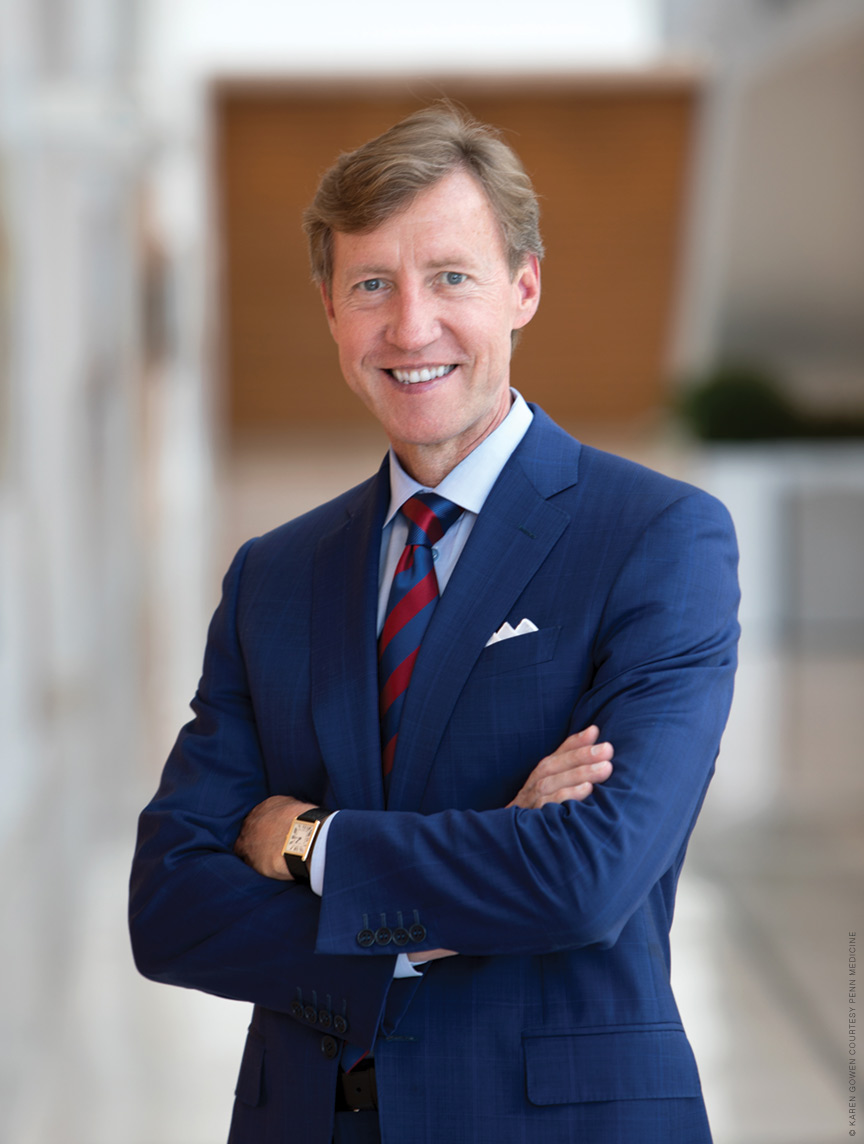
Penn’s longest serving dean, who has led Penn Medicine for more than 12 years, took office in December.
J. Larry Jameson, executive vice president of the University of Pennsylvania for the Health System and dean of the Raymond and Ruth Perelman School of Medicine, was appointed as the University’s interim president in December, following the resignations of President Liz Magill and Scott L. Bok C’81 W’81 L’84, chair of the board of trustees.
“Penn is fortunate to have the benefit of Dr. Jameson’s experience and leadership during this time of transition,” said board of trustees interim chair Julie Beren Platt C’79 in a statement announcing the appointment.
She described Jameson as “a consummate University citizen” and “a collaborative, innovative, and visionary leader with extensive engagement with each of Penn’s 12 schools,” having served on or chaired committees reviewing the School of Arts and Sciences and on previous searches to select the provost, Wharton dean, and president. “Dr. Jameson has a deep appreciation for Penn’s values and world-class research, teaching, patient care, and service,” the statement continued.
“I am honored that the board of trustees has asked me to serve as Penn’s interim president,” Jameson said. “I accept this responsibility clear-eyed about the challenges facing our University.” (For more, see “From College Hall,” in this issue.)
Jameson has a long professional history at Penn, having served since 2011 as dean of the medical school and executive vice president for the health system, and he is also a Penn parent. His tenure has been a time of “unprecedented scientific breakthroughs, FDA approved medications, and transformative platform technologies such as CAR T cell treatment, and mRNA-based COVID-19 vaccines,” Platt said.
In 2020, Jameson steered Penn Medicine through the COVID-19 pandemic. In a webinar with other health system leaders two months after it began, he vowed that “we will innovate our way out of this crisis. We will invent better tests. We will find new drugs. We will assist in the development of new vaccines. We will continue to support our local communities. We will learn lessons from this pandemic and use these lessons to create a better future in education, the workplace, and in healthcare” [“Penn and the Pandemic,” Jul|Aug 2020].
In her statement, Platt also pointed to Jameson’s role in spearheading the construction of the $1.6 billion Penn Medicine Pavilion [“Gazetteer,” Jan|Feb 2022], “a game-changing patient care facility that was the largest capital project in Penn’s history.” During Penn’s most recent fundraising campaign, The Power of Penn, which concluded in 2021, Penn Medicine’s share of the $5.4 billion raised overall was $1.68 billion [“Gazetteer,” Nov|Dec 2021]. In fiscal year 2022, Penn Medicine’s annual operating revenue was $11.1 billion, including nearly $1.1 billion in total sponsored research, $550 million in awards from the National Institutes of Health, and close to $258 million in gifts.
Jameson has also led the development of Penn Medicine’s new strategic plan for 2023–2028, Serving a Changing World, which lays out five guiding “pillars” for the future: Lead with humanity in everything we do; make breathtaking discoveries and put them to work; simplify care delivery and place it within reach; develop people for great accomplishment; and uplift our community, our environment, and ourselves. Platt’s statement further noted that Jameson “has championed initiatives that promote excellence on all levels, including faculty recruitment, student success, scholarship and discovery, philanthropic giving, and a culture of inclusion and collaboration.”
The author of more than 350 scientific publications in books and leading journals including the New England Journal of Medicine, Nature Genetics, Science, and the Journal of Clinical Investigation, Jameson has conducted pioneering studies in the genetic basis of hormonal disorders. He’s led a variety of medical associations; won numerous awards, including from the American Thyroid Association, the Endocrine Society, and the American College of Surgeons; and is a member of the American Academy of Arts and Sciences as well as the National Academy of Medicine.
Jameson earned his medical degree and a doctorate in biochemistry in 1981 from the University of North Carolina. After clinical training in internal medicine and endocrinology at the Massachusetts General Hospital in Boston, he joined Harvard Medical School, eventually becoming an associate professor of medicine and chief of the thyroid unit at Massachusetts General Hospital. Before joining Penn Medicine, he was dean of the Feinberg School of Medicine and vice president of medical affairs at Northwestern University for four years.
Jonathan Epstein, executive vice dean and chief scientific officer of the School of Medicine and the health system’s senior vice president and chief scientific officer, was named as Jameson’s interim replacement at Penn Medicine. —JP




